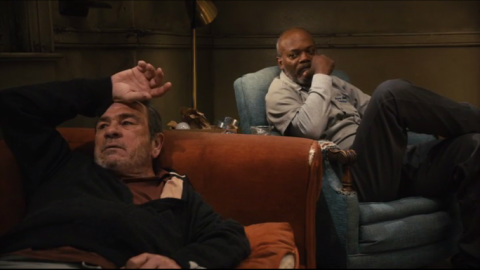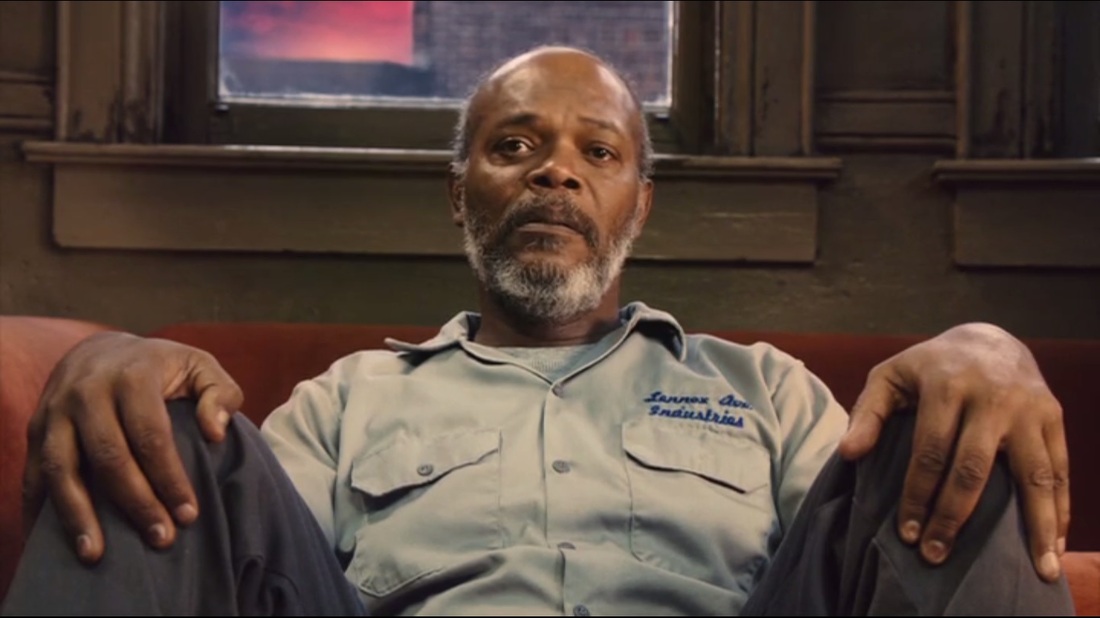
I have recently read Cormac McCarthy's The Sunset Limited, subtitled 'A Novel in Dramatic Form.' Then, I've also just seen the film, directed by Tommy Lee Jones with the constant input of McCarthy himself, and starring Jones as 'White,' and the unparalleled Samuel L. Jackson as 'Black.' The work is a two-person, one-room dialogue, centered on the meaning of life or, more aptly put, on the question of whether or not life is worth living. Though I am speculating without the slightest bit of evidence, I want to think that McCarthy chose the dialogue format for this existential inquiry as an homage to the greats, like Plato and Hume.
White is a professor (of philosophy, we are given to understand), while Black is an ex-convict and ex-addict who found religious faith after a prison brawl nearly took his life. He lives in a tenement building in the ghettos of New York, possessing only the bare essentials because, anything beyond the essentials, he says, 'the junkies'd steal.' White has reached the conclusion that 'Western Civilization finally went up in smoke in the chimneys at Dachau but I was too infatuated to see it. I see it now', and hence, on the morning of his birthday, he attempts to end his own life by throwing himself in front of the Sunset Limited, the famous train that runs from New Orleans to Los Angeles. (By the way, I'm no expert on the United States railways, but my understanding is that for at least some of its illustrious history, the Sunset Limited did indeed offer service to New York City). It is important to note, however, that White's suicidal intentions are not, at least according to his own assessment, rooted exclusively in his own individual unhappiness, but rather, in an honest assessment of the world, 'that the world is basically a forced labor camp from which the workers---perfectly innocent---are led forth by lottery, a few each day, to be executed.' Like Camus' characterization of the absurd, White's is a despair of the intellect. As Black correctly interprets White's view of the world, 'everbody that aint just eat up with the dumb-ass ought to be suicidal.' Black, apparently discerning White's intentions from the platform, interrupted his self-destructive efforts, leading him back to Black's apartment and holding him (by discursive, not physical, force) in an effort to convince him that he is wrong, that life is indeed worth living.
What ensues is an enthralling, completely human, and believable conversation---between the cold and harsh 'realism' of White's intellect and culture, and the simple 'optimism' of Black's faith. White says to Black, 'I gather it to be your belief that culture tends to contribute to human misery. That the more one knows the more unhappy one is likely to be,' to which Black responds, 'I dont believe I said that. In fact, I think maybe you said it.' Through the course of the conversation, the interlocutors, by turns, take the reins, with the perspectives of each alternately assuming the dominant role. Finally, in the end, not drastically unlike Meursault's verbal assault on the priest toward the end of Camus' The Stranger, White unloads his nihilism on Black in an eloquent soliloquy on the hopelessness of the human condition.
In the Third Essay of On the Genealogy of Morality, Nietzsche characterizes nihilism in the following way:
'What is to be feared, what has a doomful effect such as no other doom, would not be the great fear but rather the great disgust at man; likewise the great compassion for man. Supposing that these two should mate one day, then immediately something of the most uncanny nature would unavoidably come into the world, the "last will" of man, his will to nothingness, nihilism.'
Taken in the most literal sense possible, 'compassion' means 'suffering with,' and what Nietzsche calls nihilism arises like a plague wherever this suffering-with finds itself coupled with disgust at the human condition. White echoes this diagnosis almost to the letter in the following passage:
'You tell me that my brother is my salvation? My salvation? Well then damn him. Damn him in every shape and form and guise. Do I see myself in him? Yes. I do. And what I see sickens me. Do you understand me? Can you understand me?'
This monologue is portrayed beautifully by Jones and Jackson in the film, as Jones, lost in the dark, seductive beauty, l'appel du vide of his own sickly view of life, soliloquizes while moving triumphantly around the perimeter of the room, with Jackson sitting at the table, head in hands, immersed dizzily in the blinding ressentiment and grotesqueness of White's words. In the end, Black is nearly paralyzed by White's despairing view of life, and, having lost his control over White, allows him to leave the apartment (where he will presumably take his own life). Like Job, who shouts to the heavens, demanding an answer from the divine, Black shouts to God, 'If you wanted me to help him how come you didnt give me the words? You give em to him. What about me?'
But it would be a mistake, I think, to read this dialogue too simply or carelessly. One common way to read it is to draw the conclusion that the professor 'wins' the debate. In the end, Black is forced to accept White's unforgiving view of life and of human nature; that, just as Meursault levels the priest in the final pages of The Stranger, White levels Black with his unapologetically honest presentation of the world, and it is revealed that the only way of staving off the inevitable despair of the human condition is to blindly hide behind religious dogma, as Black has done since his prison days. On this reading, Black retreats to his simple-minded faith in the end, when he says to God, 'That's all right. That's all right. If you never speak again you know I'll keep your word. You know I will. You know I'm good for it.' I think this is a misreading.
It is worth noting, whatever else we might say about Black, he is not merely a passive or unreflective believer (if there is any such thing). He is not as simple internally or intellectually as he lets on to White (and as he might even believe himself to be). While his religious faith is couched in the language of Christian doctrine, Black is a self-proclaimed 'outlaw' and 'heretic' as regards religious orthodoxy. When White asks Black if he believes, literally, in every word of the Bible, Black responds that he disagrees, 'probably' with the notion of original sin. His espousal of the Christian doctrine is rooted more in his conviction of the spark of divinity in the heart of the person than it is in credal recitations. Of the Bible, he says,
'I think whatever truth is wrote in these pages is wrote in the human heart too and it was wrote there a long time ago and will still be wrote there a long time hence. Even if this book is burned ever copy of it. What Jesus said? I don't think he made up a word of it. I think he just told it. This book is a guide for the ignorant and the sick at heart. A whole man wouldnt need it at all.'
Of Jesus he says,
'He couldnt come down here and take the form of a man if that form was not done shaped to accommodate him. And if I said that there aint no way for Jesus to be ever man without ever man bein Jesus then I believe that might be a pretty big heresy. But that's all right. It aint as big a heresy as sayin that a man aint all that much different from a rock. Which is how your view looks to me.'
Black's view of salvation is rooted then in the affirmative embrace of this spark of divinity:
'You dont want it cause to get it you got to let your brother off the hook. You got to actually take him and hold him in your arms and it dont make no difference what color he is or what he smells like or even if he dont want to be held. And the reason you wont do it is because he dont deserve it. And about that there aint no argument. He dont deserve it.'
To be saved means simply to love, according to Black. It means to say 'yes' to life, with all its flaws and imperfections. It means to love, as Deleuze says, 'without remembering ... without taking stock.' This brings us to the final moments of the dialogue. The quick reading says that Black retreats to his religious 'comforts' in order to mask the existential horror with which White has just confronted him. But while Black has a momentary lapse, horrified by White's callousness toward life, Black's concluding words and gestures demonstrate not a weakening, but a restabilization, a regaining of his footing in the world. For as he says 'If you never speak again you know I'll keep your word,' he lifts his head, asking twice, 'Is that okay?' In the film, Jackson's first iteration of this question has him looking upward to the ceiling, while in the second, he looks directly into the camera, at the spark of divinity in the viewer.

 RSS Feed
RSS Feed